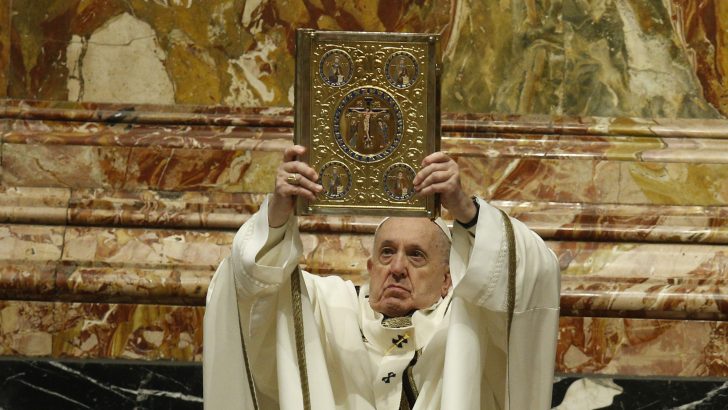In times of doubt and suffering, Christians must not focus on their problems, but instead lift up their eyes to God in hope, Pope Francis said on the feast of the Epiphany.
“This does not mean denying reality, or deluding ourselves into thinking that all is well. Rather, it is a matter of viewing problems and anxieties in a new way, knowing that the Lord is aware of our troubles, attentive to our prayers and not indifferent to the tears we shed,” the Pope said.
Pope Francis celebrated Mass with a little over 100 people at the Altar of the Chair St. Peter’s Basilica January 6. After celebrating Mass, he prayed the Angelus in the library of the Apostolic Palace.
In his Angelus address, the Pope said that Christ “was born not only for some, but for all men and women, for all peoples”.
Christians, he added, “must also be the star for our brothers and sisters” and shine bright “by drawing near to the other, encountering the other, assuming the reality of the other. This is the only way that the light of God, who is love, can shine in those who welcome it and attract others”.
Worship
Earlier, in his homily at Mass, the Pope focused on three phrases proclaimed in the day’s readings that offered “a few useful lessons from the Magi” on “what it means to be worshippers of the Lord”.
Reflecting on the first reading from the prophet Isaiah, the Pope said the words of encouragement – “lift up your eyes” – spoken to the exiled people of Israel are a call to “lay aside their weariness and complaints, to escape… the constant temptation to withdraw into ourselves and our own concerns”.
The second phrase – “to set out on a journey” – recalls the Magi’s journey to Bethlehem to worship baby Jesus, he continued.
A journey, he said, always sparks a “transformation, a change” in which one learns new things and finds “inner strength amid the hardships and risks” he or she may encounter along the way.
Pope Francis said the final phrase – “to see” – invites Christians to look “beyond the veil of things visible, which often prove deceptive,” and instead follow the example of the Magi who observed the world with a “theological realism” that allowed them to perceive “the objective reality of things and leads to the realisation that God shuns all ostentation”.
CNS


 Ruadhán Jones
Ruadhán Jones Pope Francis raises the Book of the Gospels as he celebrates Mass on the feast of the Epiphany in St. Peter's Basilica at the Vatican Jan. 6, 2021. (CNS photo/Paul Haring)
Pope Francis raises the Book of the Gospels as he celebrates Mass on the feast of the Epiphany in St. Peter's Basilica at the Vatican Jan. 6, 2021. (CNS photo/Paul Haring) 